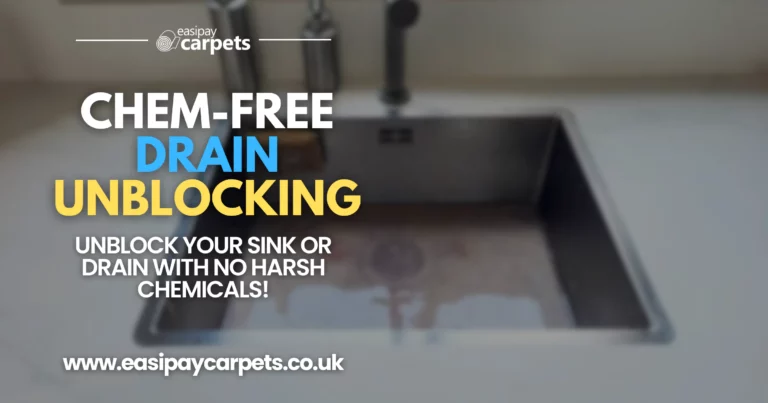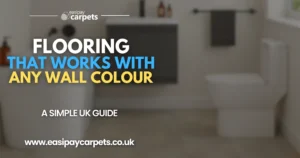

How to Unblock a Sink or Drain Without Expensive Products
A blocked sink or drain can be a frustrating and messy problem, but before you reach for expensive drain cleaners or call a plumber, try these simple, effective, and budget-friendly methods using household items.
Many store-bought drain cleaners contain harsh chemicals that can damage your pipes over time and pose health risks. Fortunately, you can clear most blockages with natural and DIY solutions that are just as effective.
Common Causes of Sink and Drain Blockages
Understanding what causes blockages can help you prevent them in the future.
Kitchen Sink Blockages
- Grease, oil, and fat solidifying in pipes.
- Food scraps, coffee grounds, and small debris accumulating.
- Soap residue and washing-up liquid build-up.
Bathroom Sink & Shower Blockages
- Hair and soap scum clogging pipes.
- Toothpaste and other hygiene products forming a sticky residue.
- Hard water deposits reducing water flow.
Outdoor & Utility Drains
- Leaves, dirt, and garden debris blocking the drain.
- Small objects getting lodged in outdoor drain pipes.
DIY Methods to Unblock a Sink or Drain
Before using these methods, remove any visible debris around the plughole and wear rubber gloves if needed.
1. Boiling Water Method (For Grease & Soap Blockages)
✔ Best for: Kitchen sinks clogged with grease or soap build-up.
How to Do It:
- Boil a full kettle of water.
- Slowly pour it down the drain in two to three stages, allowing it to work for a few seconds between pours.
- Run hot tap water to check if the blockage has cleared.
Why It Works:
Boiling water melts grease and dissolves soap scum, allowing it to flush through the pipes.
⚠ Warning: Do not use this method on PVC pipes or toilet blockages, as boiling water can soften plastic pipes or damage toilet seals.
2. Baking Soda & Vinegar Method (Natural Unclogger)
✔ Best for: Bathroom and kitchen sinks with mild blockages.
How to Do It:
- Pour ½ cup of baking soda down the drain.
- Follow with 1 cup of white vinegar.
- Let it fizz and bubble for 10-15 minutes.
- Flush with hot water to clear loosened debris.
Why It Works:
The chemical reaction between baking soda and vinegar breaks down grease, soap scum, and minor clogs without harsh chemicals.
3. Salt & Hot Water Method (Quick Grease Cutter)
✔ Best for: Greasy blockages in kitchen sinks.
How to Do It:
- Pour ½ cup of table salt directly into the drain.
- Follow with boiling water and leave it for 5-10 minutes.
- Flush with hot tap water.
Why It Works:
Salt absorbs grease and loosens debris, making it easier to wash away.
4. Plunger Method (Manual Unclogging)
✔ Best for: Solid blockages in sinks, showers, and bathtubs.
How to Do It:
- Fill the sink with enough water to cover the plunger’s rubber cup.
- Place the plunger over the drain and press down firmly.
- Use strong, quick plunges for 20-30 seconds.
- Remove the plunger and check if water drains freely.
Why It Works:
Plunging creates suction that can dislodge stuck food, hair, or debris from the pipes.
⚠ Tip: Block the overflow hole with a cloth or tape for better suction.
5. Wire Coat Hanger Method (For Hair & Solid Debris)
✔ Best for: Hair clogs in bathroom sinks and showers.
How to Do It:
- Unwind a wire coat hanger and create a small hook at one end.
- Insert the hook into the drain and gently pull out any trapped hair or debris.
- Flush with warm water to clear any residue.
Why It Works:
A wire hanger is strong yet flexible, making it ideal for removing hair clumps that clog bathroom drains.
⚠ Tip: For a more effective tool, consider using a drain snake or drain cleaning brush.
6. Washing Up Liquid & Hot Water (For Grease & Food Clogs)
✔ Best for: Kitchen sinks with fat or oil blockages.
How to Do It:
- Pour ½ cup of washing-up liquid down the drain.
- Follow with boiling water to break down grease.
- Use a plunger if necessary for extra force.
Why It Works:
Washing-up liquid breaks down greasy residue and lubricates the pipes to help flush blockages away.
Preventing Future Sink & Drain Blockages
✔ Use a drain strainer to catch food, hair, and debris.
✔ Avoid pouring grease, oil, or coffee grounds down the sink.
✔ Flush drains regularly with boiling water or baking soda and vinegar.
✔ Brush hair before showering to reduce loose strands in drains.
✔ Run hot water after washing up to prevent grease build-up.
When to Call a Plumber
If you’ve tried these DIY methods and your sink or drain remains blocked, it might be time to call a professional. Signs that you need a plumber include:
- Multiple drains blocked at the same time.
- Water backing up into sinks or tubs.
- Foul smells that don’t go away after cleaning.
- Gurgling sounds from pipes, even when not in use.
A professional plumber can diagnose deeper pipe issues and use specialist tools to clear stubborn blockages.
Conclusion
Unblocking a sink or drain doesn’t have to be expensive or require harsh chemicals. By using simple, natural, and budget-friendly methods, you can easily clear blockages and keep your drains running smoothly.
By following preventative measures, you can also reduce the chances of future clogs, saving you both time and money.
Are you on the hunt for new flooring? With Easipay Carpets you can get the flooring of your dreams from as little as £10 per week, completely interest free! We offer Carpets, Vinyl and Laminate flooring with free underlay, door bars, carpet grippers and beading wherever needed on payment plans that spread the cost of the flooring into smaller, more manageable payments. Find out more at the button below!
Still Got Questions? Here's 10 FAQs!
No, they are safe for most pipes, but avoid using them excessively on older plumbing.
Once a month, using boiling water or baking soda and vinegar.
The boiling water method is the quickest for minor blockages.
Some methods, like plunging, work, but avoid boiling water as it may crack the toilet bowl.
There may be trapped grease or food residue—use baking soda and vinegar to remove odours.




